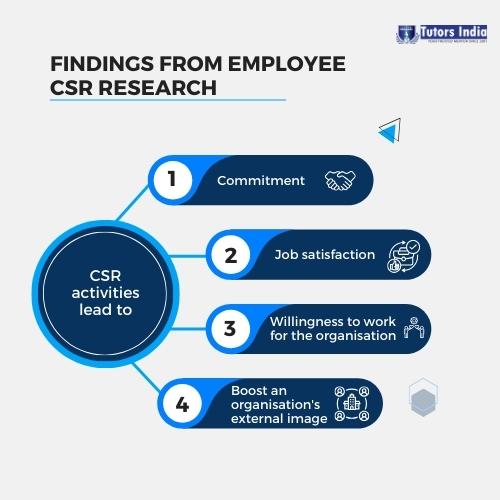Exploring employee–CSR relationship – Future research directions
What is Corporate Social Responsibility?
Business organisations have evolved from solely focusing on profit maximisation to being involved in activities that contribute to the welfare of stakeholders, like providing employee benefits, investing in sustainable practices and organizing projects that help people in less developed countries. These activities fall under a broad concept known as Corporate Social Responsibility (CSR). Corporate social responsibility has become a mainstream business endeavour (Rodriguez-Gomez, 2020).
Companies invest in CSR activities because they help increase profitability and brand value. Companies that engage in corporate social responsibility, also known as corporate citizenship, can be aware of their impact on all parts of society, including the economic, social, and environmental. Companies engaging in CSR at the workplace help improve morale, employee well-being and overall productivity (Marakova, 2021).

Previous studies on corporate social responsibility and employee relations
Research on CSR has risen exponentially to become a mainstream topic of study for management research. Most of the research has been undertaken at the institutional and organisational levels of analysis, focusing on the financial ramifications of organisations adopting a more socially responsible business model. Furthermore, a growing body of management literature has emphasized the need to explore CSR’s position as a strategic instrument for improving business and stakeholder relations (Espasandín-Bustelo, 2021).
CSR is a type of relational competitive dynamics that considers various stakeholders with diverse motivations when building competitive initiatives and aims to achieve win-win relationships with them (Bandeira Pinheiro, 2021).
Employee psychological, attitudinal, and behavioural responses to perceived CSR have lately been studied in the CSR literature. Perceived CSR reflects an employee’s perception of the impact of their organisation’s actions aimed at improving the well-being of external stakeholders (including the natural environment), corresponding to a form of third-party justice from an employee-centric perspective on CSR (Paruzel, 2021).
Previous studies have shown that social Identity theory has been used to explain and predict the response of employees to CSR. According to research, organisational identification, which deals with the perception of belongingness in an organisation, is the driving force for commitment, job satisfaction and the willingness to continue working for the organisation (Chang, 2021).
Research has also shown that involving employees in CSR helps boost an organisation’s external image. A study by Singh (2021) has shown that employees engaging in corporate philanthropic activities help support the external image. Another study by Ramayah (2022) revealed that engaging employees in CSR facilitates building the reputation of an organization.
Check out our dissertation example on the credibility of CSR reports to know the factors influencing it.
Future research directions
Findings from previous research have unveiled some gaps. The gaps include the lack of clarity on the concept of CSR among the employees, how employees are targets for responsibility, and microlevel CSR research on employees. Employees may also doubt the credibility of CSR (Onkila, 2022).
The knowledge gaps can give rise to the following research directions:
- A study on the bottom-up challenges of employee-CSR activities.
- Research on understanding differences in the understanding of CSR among employees.
- A study on the importance of employees as targets of CSR activities.
- Research on how organizational diversity influences CSR activities.
- Research on developing standardized tools to analyze the impact of CSR on employees
- Theoretical, Methodological and Contextual approaches of CSR–employee relationship
Conclusion
Companies have increasingly moved from the concept of ‘profit only’ to activities contributing to the welfare of the stakeholders. Involving in CSR activities helps improve the brand image and profitability of an organisation. While there has been a lot of research on CSR and employee relations, the results reveal that CSR helps employees support an organization’s reputation and foster job satisfaction. Future research directions can deal with the challenges of employee-CSR activities, employees as targets for CSR activities, how organizational diversity influences CSR and developing standardized tools to analyse the impact of CSR on employees. These research ideas can be useful for management students in selecting their topics for master’s dissertation.
About Tutors India
We are a team of experienced academic writers and researchers who offer dissertation assistance. We know the challenges students face during dissertations and offer personalised guidance to address them. We also assist with referencing and proofreading, ensure the dissertations are error- and plagiarism-free, and follow the dissertation guidelines.
To know more about how a dissertation is written in different specialisations, check out our dissertation examples.
References
- Rodriguez-Gomez, S., Arco-Castro, M. L., Lopez-Perez, M. V., & Rodríguez-Ariza, L. (2020). Where does CSR come from and where does it go? A review of the state of the art. Administrative Sciences, 10(3), 60.
- Marakova, V., Wolak-Tuzimek, A., & Tučková, Z. (2021). Corporate social responsibility as a source of competitive advantage in large enterprises. Journal of Competitiveness.
- Espasandín-Bustelo, F., Ganaza-Vargas, J., & Diaz-Carrion, R. (2021). Employee happiness and corporate social responsibility: The role of organizational culture. Employee Relations: The International Journal, 43(3), 609-629.
- Bandeira Pinheiro, A., da Silva Filho, J. C. L., & Moreira, M. Z. (2021). Institutional drivers for corporate social responsibility in the utilities sector. Revista de Gestão, 28(3), 186-204.
- Paruzel, A., Klug, H. J., & Maier, G. W. (2021). The relationship between perceived corporate social responsibility and employee-related outcomes: A meta-analysis. Frontiers in Psychology, 12, 607108.
- Chang, C. H., Lin, H. W., Tsai, W. H., Wang, W. L., & Huang, C. T. (2021). Employee satisfaction, corporate social responsibility and financial performance. Sustainability, 13(18), 9996.
- Singh, K., & Misra, M. (2021). Linking corporate social responsibility (CSR) and organizational performance: The moderating effect of corporate reputation. European Research on Management and Business Economics, 27(1), 100139.
- Ramayah, T., Falahat, M., & Soto‐Acosta, P. (2022). Effects of corporate social responsibility on employee commitment and corporate reputation: Evidence from a transitional economy. Corporate Social Responsibility and Environmental Management, 29(6), 2006-2015.
- Onkila, T., & Sarna, B. (2022). A systematic literature review on employee relations with CSR: State of art and future research agenda. Corporate Social Responsibility and Environmental Management,29(2), 435-447.

 Previous Post
Previous Post Next Post
Next Post